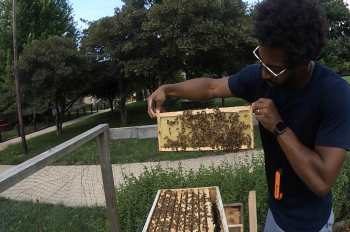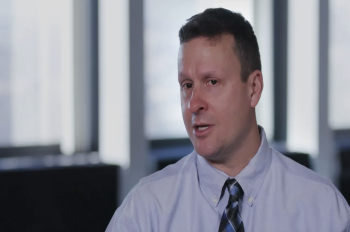New Professor Brings Separation Science and Sustainability Research to Department of Chemistry

For new Illinois Institute of Technology Assistant Professor of Chemistry Sameh Elsaidi, a passion for science runs in the family. Elsaidi, who grew up in Alexandria, Egypt, is the son of a father who teaches elementary school science. As an elementary school student, Elsaidi had his father as a teacher.
“I was always asking him a lot of questions,” Elsaidi says. “His talks about how experiments worked and how atoms interact were invaluable. My father always encouraged me, and I was greatly inspired by science.”
As of January 2022, Elsaidi is the latest hire in the Department of Chemistry, where his work focuses on materials chemistry and, more specifically, separation science and sustainability.
“In my group, we are working on materials design, specifically on how to think at the molecular level and how to arrange atoms and molecules in the way that you want,” Elsaidi says. “I chose materials chemistry as a research area because it is a multidisciplinary field of study, and I believe that we can develop materials for a wide range of applications. I believe that we are capable of designing materials for almost any application. I believe that we can control the material at all levels, from atomic to molecular to solid-state."
Elsaidi earned a bachelor of science in chemistry from Alexandria University in 2005 and spent the next five years teaching chemistry at the university while also taking courses as a graduate student in chemistry. He relocated to Florida for a doctoral program in inorganic chemistry at the University of South Florida in 2011, earning his Ph.D. in 2014. He then worked as a visiting assistant professor at Pacific Northwest National Laboratory in Washington before joining the National Energy Technology Laboratory in Pittsburgh as a research scientist. Elsaidi also served as a visiting research scientist at University of California, Berkeley in 2019, and in 2020 co-founded SE-MAT Smartly Engineered Materials LLC, a manufacturer of task-specific materials for which he continues to serve as chief executive officer.
Like his father, Elsaidi finds teaching very fulfilling, and he is excited to work with students and postdoctoral researchers on projects in his lab, the Center of Separation Science and Sustainability. The group focuses on materials design.
“[Materials design] is a much broader area and gives an opportunity for my students to master not only chemistry but also chemical engineering,” Elsaidi says. “It’s a bridge between chemistry and chemical engineering—how to transition materials from the laboratory to the industrial scale. We are interested in developing materials for energy storage applications from a sustainability standpoint. We are attempting to recover valuable elements from waste, such as uranium from seawater or nuclear waste. This entails the extraction of various elements, such as precious metals, lithium, and rare earth elements to maintain a sustainable system.”
One of the main research interests in Elsaidi’s lab is separation science, he says.
“We focus on bridging environmental preservation and energy-related applications in this area of research,” Elsaidi says. “For example, we are currently working on the capture and conversion of carbon dioxide, which has the potential to solve the problem of climate change while also producing clean fuels. This also falls under the umbrella of sustainability, and this is the ambition I have for my lab.”
Additional projects in Elsaidi’s lab are aimed at separating radioactive gases for nuclear waste management and separating hydrocarbons. He has been working with two graduate student researchers, two master’s students, one undergraduate, and one postdoctoral researcher, and he anticipates three new graduate students joining the group in the fall.
“One of my main goals is to ensure my students’ success in the lab and throughout their careers,” Elsaidi says. “I tell my students all the time that we are a small family within the [chemistry department] and within the larger family at Illinois Tech. We are constantly striving for group success and collaborating with colleagues in our department and other departments. Our communication with one another is how we generate novel ideas, or how we ensure that our work is complementary, in order to obtain the full story and the true outcome of our collaboration.”
Elsaidi expresses enthusiasm for continued collaboration across departments within the university as well as to taking advantage of the school’s close proximity to other major universities and research facilities. He is actively applying for grant funding with the goal of continuously expanding the separation science and sustainability capabilities of his lab.
Photo: Illinois Tech Assistant Professor of Chemistry Sameh Elsaidi




